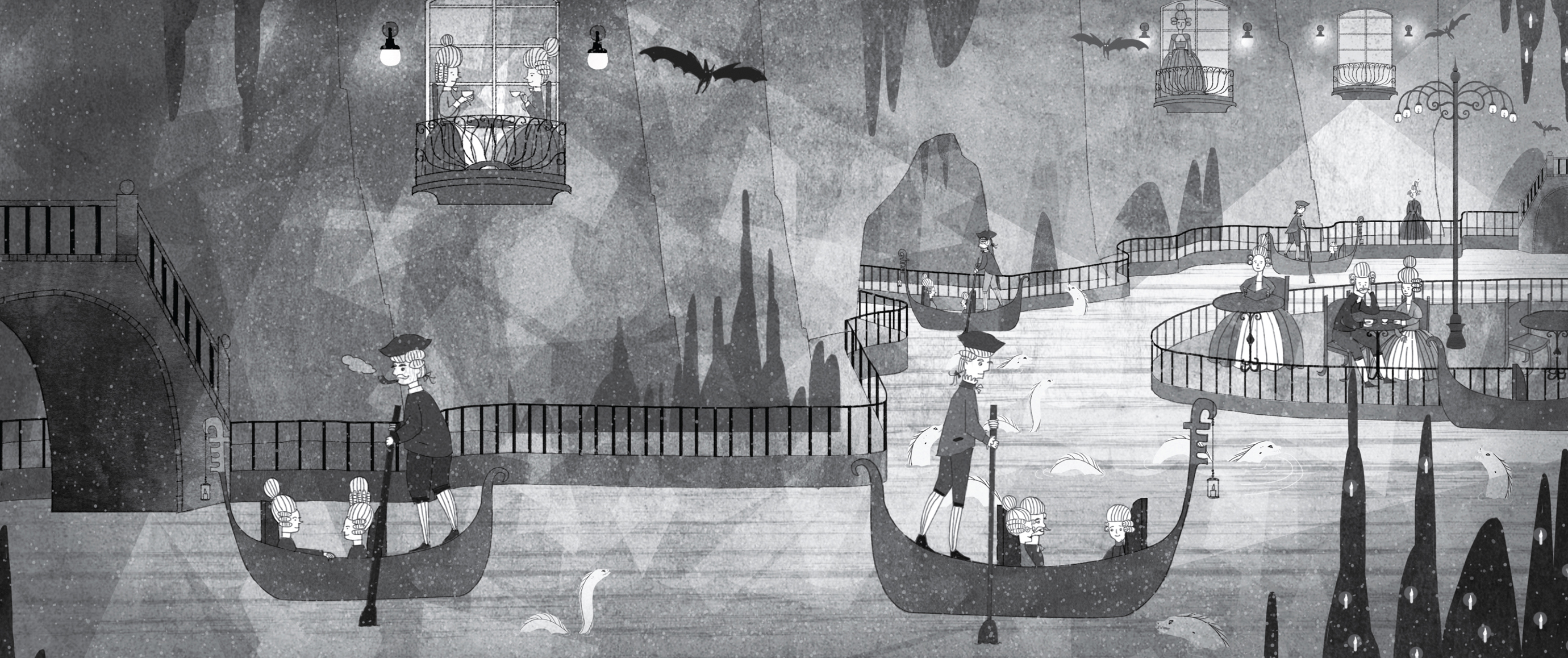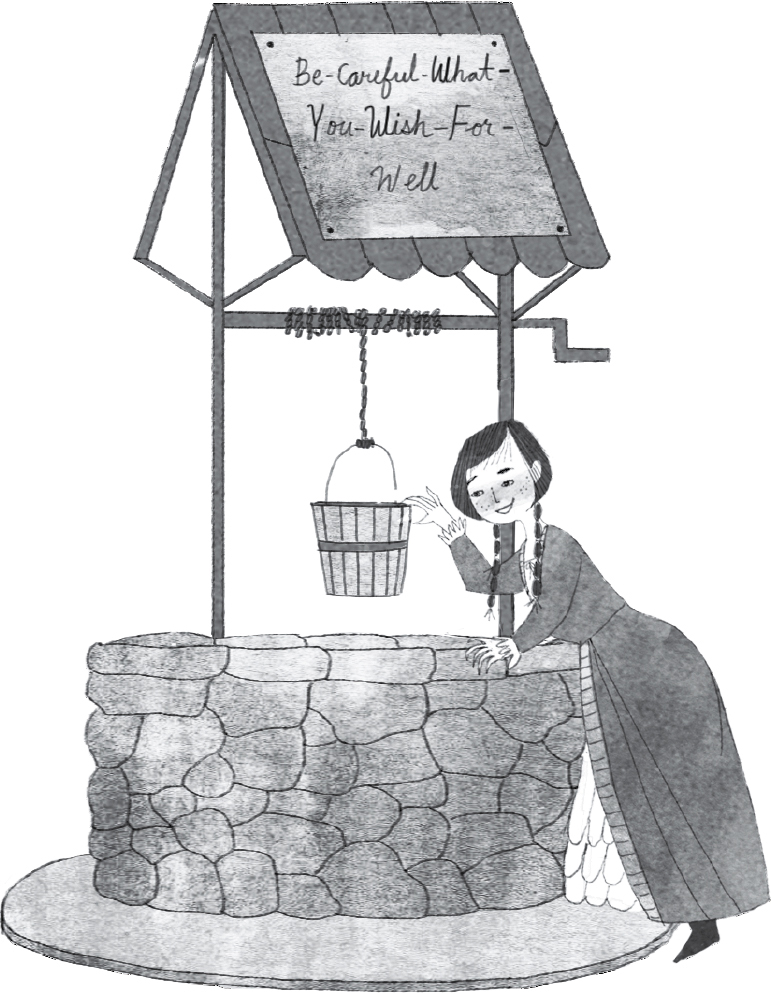 7
7 
Nowhere Special
“THE LAGOON IS very mopey today,” Belfry announced. “Woebegone, one might say.”
“Booohooooo.”
Anastasia peered over the edge of the gondola, watching the reflections of candle flames skate across the lake’s silver skin. Thoughts rattled her brain like the candy innards of a tortured piñata. What would Pettifog Academy be like? Would she ever learn how to loo in a crinoline? Would she learn to speak Echolalia? On the other hand, perhaps she didn’t really need to converse with her bat-in-waiting. Pippistrella was sound asleep again, snoring beneath one of Anastasia’s braids.
“How much do bats sleep?” she whispered.
“It depends,” Penny said. “Pippistrella is a little brown bat, and I think they can sleep up to nineteen hours a day.”
Belfry guided the gondola into a tunnel.
“Why didn’t Grandwiggy eat breakfast with us?” Anastasia asked.
“Wiggy usually rises very early,” Penny said. “She eats in her chambers and then goes to work.”
“Work? But she’s the queen!” Anastasia envisioned her grandmother, in stiff lace collar and crystal crown, demonstrating vacuum cleaners cave to cave. “I thought queens just sat around and drank tea.”
“The queen has a lot of responsibilities, Anastasia,” Penny said. “She spends most of her time reviewing laws and meeting with Congress and diplomats.”
“What about Saskia? She wasn’t at breakfast, either.”
“Ludowiga has been taking her meals in her private suite for centuries. I imagine Saskia dines with her.”
Baldwin harrumphed.
“While we’re on the subject of private quarters,” Penny said, “there are places in Cavepearl Palace where you shouldn’t wander, dear. Wiggy’s office is strictly off-limits, of course, and so are her chambers.”
“But the palace is your home, too,” Baldwin said. “We want you to feel comfortable there.”
“How long will it be my home, exactly?” Anastasia asked. “Am I ever going back to Mooselick?”
“Oh, Anastasia. I don’t know.” Penny plucked nervously at one of her buttons. “I’m not sure what the future holds. For now you’re safe in Nowhere Special. CRUD has no idea about the Cavelands—thank goodness.”

The canal widened. Glass globes flickered over gondolas moored by doorways, and burning chandeliers made windows wink. Wrought-iron balconies scrolled along the tunnel walls, and ladies in fancy dresses munched cinnamon buns and watched them pass.
“This is the Upper East Side of Nowhere Special,” Penny said.
“Posh,” Baldwin added. “Lots of Ludowiga’s ritzy friends live in this neighborhood.”
The conduit spat them into a large cave. Across the dome, the lagoon lapped at the edges of a wide plaza swarming with people.
“Dark-o’-the-Moon Common,” Belfry announced, angling them toward a dock clustered with gondolas. The boatmen all wore white wigs. Some of them were singing, and several were smoking pipes and chatting.
“The black boats are private gondolas, and the green ones are water taxis,” Penny said. “As you’ve already seen, much of the Cavelands is connected by the canal system. There are pedestrian tunnels, of course, and some bridges, but there are also places you can only get to by boat.”
“Can’t people just turn into bats and fly?”
“Ah, but what about clothes?” Baldwin said. “You couldn’t very well flap off to tea and arrive in your birthday suit!”
“Besides, not all Morfolk shift into bats,” Penny added, boosting Anastasia up to the pier.
The plaza’s damp cobblestones gleamed beneath its old-fashioned lamps, and murky puddles mirrored the dark shapes of bats whirring above. Hundreds of people crowded the common, clutching shopping bags and pushing baby buggies and perusing the windows of little shop caves. Many of them carried umbrellas to protect their wigs from the droplets sprinkling from the plaza’s snaggletoothed vault.
Anastasia had worried about looking silly in her fancy gown, but the crowd frothed with crinolines and lace collars. “Does everyone dress funny in Nowhere Special?”
“You have to remember, dear, Morfolk live for centuries,” Penny said. “Fashions don’t change very swiftly in the Cavelands.”
“We’re still wearing eighteenth-century duds down here.” Baldwin tugged the edges of his cravat.
“Look!” Anastasia cried, hopscotching toward a cylinder of stones. “A wishing well!” She leaned over its curve, hoping to spot the glimmer of wished-upon coins down below, but the mossy stones pitched into gloom.

“Careful.” Baldwin crooked his forefinger under Anastasia’s collar and tugged her back. “I’m not sure how sturdy that old thing is.”
Two wooden joists extended from the well’s sides to support a little roof, and a bucket dangled on a rope coiled around a central rod. Anastasia twisted the crank, lowering the bucket a few feet. “Can I have a penny to throw?”
“How about your aunt Penny?” Baldwin quipped.
“We don’t have pennies down here,” Penny said, ignoring him. “We have lunamarks, queenlies, quartzes, and pinklies.”
“Besides,” Baldwin said, “you wouldn’t want to send a coin down this well, anyway.” He pulled her to the far side of the well and tapped a bronze sign bolted to the roof.
BE-CAREFUL-WHAT-YOU-WISH-FOR WELL
“Nobody wishes on this well anymore,” he said. “The wishes haven’t been coming out right for centuries. The last person to make a wish here was Ralph Dundermooth, the poor sod.”
“What happened to him?” Anastasia asked.
“He wished he never had to hear another whoopee cushion. He tested whoopee cushions at a factory, you see,” Penny added hastily. “And he was getting tired of it.”
“Baffling,” Baldwin said. “How anyone could tire of that job, I will never understand.”
“Anyway, a few days after Ralph tossed his lunamark down the well, his wish came true: he went deaf. He didn’t hear anything after that.”
“A real shame, because he was a brilliant composer in his spare time,” Baldwin said. “And then there was Countess Pewter-Pimple. Remember that, Penny? She wished for a man to sweep her off her feet, and that very night a mugger knocked her down and stole her necklace! Broke her wrist, too.”
“Do you really think the well made those things happen?” Anastasia contemplated the pile of mossy stones. “Those things might have happened anyway.”
“Maybe,” Baldwin allowed. “But I wouldn’t risk it.”
“Maggots here! Get your piping-hot maggots here!” called a man by a steel cart that resembled a hot dog stand. “Delicious, hot maggots, three quartzes and a smile!”
Pippistrella rustled against Anastasia’s braid and chirped.
“But you just had breakfast,” Penny said.
“Squeak prrrp!”
“Oh, all right.” Penny rummaged in her purse. The maggot man winked and handed a little paper sack to Anastasia.
She wrinkled her nose. “They look a little like popcorn.”
“Peepity-peep!”
Anastasia plucked out a maggot puff and gave it to Pippistrella, who began crunching by her ear.
“The wig shop is down Crescent Way,” Penny said, leading them to a narrow corridor twisting off the plaza. They passed a haberdashery (hat store, that is) and a beauty parlor and a watchmaker’s before halting by a window bristling with masses of hair. A model ship topped a lofty pompadour, a swarm of silk butterflies garnished a bouffant, and a complete twenty-three-piece tea set nested within the squiggles of a stonking great coiffure.
“The uppercrusters all try to outclass each other with bigger and better wigs,” Baldwin said. “They decorate them like birthday cakes. They trim them like Christmas trees.” He shuddered. “They bear an uncanny resemblance to poodles, don’t they? You ladies will have to soldier on without me. I’ll be at the limericker’s across the lane.”
“Coward!” Penny called after him. “Oh well. Come along, Anastasia; let’s get your wig.”